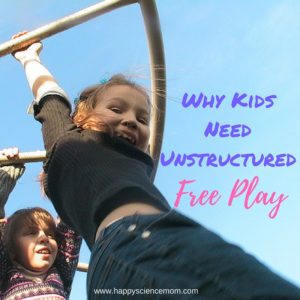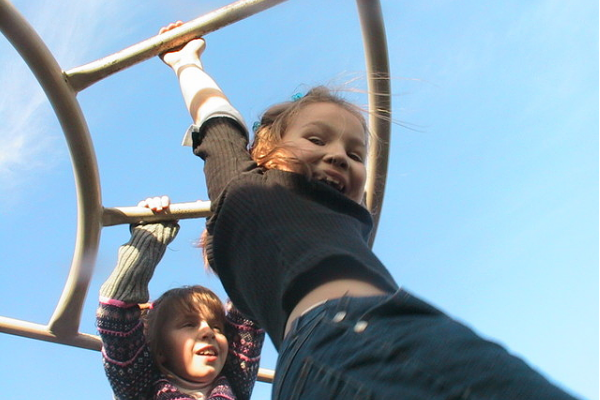
Do your children play enough? I am talking about unstructured free play when they are creating, using their imagination, and exploring on their own without your guidance. No electronics, no games with lots of rules, not even educational games and toys with a purpose.
Sadly, the art of free play has declined sharply in recent decades. “Over the past half century we have increasingly deprived children of opportunities for free play, and over that same period we have seen dramatic and continuous increases in all sorts of emotional disorders in children,” explains Peter Gray, an expert in this subject. He is a research professor at Boston College and the voice behind the Psychology Today’s blog by the same title that addresses ways we can create learning environments that optimize rather than suppress children’s play.
What’s The Problem?
When children do not have the opportunity to engage in enough free play, they suffer. Some of the drawbacks resulting from missing free play include:
- Diminished joy.
- Unable to learn self-control.
- Miss out on discovering and exploring what they most love to do and their purpose in life.
- Greater chance of experiencing anxiety, depression, and other mental health disorders.
Lena Aburdene Derhally, psychotherapist specializing in anxiety at the Imago Center in Washington, D.C., revealed that “Sadly, I continue to see many instances where play and joy are not highly valued with both younger and older children, and as a mental health professional, I see it as detrimental to the healthy development of children. Because we have become such a work- and results-driven society, free, unscheduled play for children has taken a back seat. This lack of play affects emotional development and is thought to be leading the rise of anxiety, depression and other mental disorders in children.”
Benefits Of Free Play
Why should we encourage more free play? According to Ashley Soderlund, psychologist and author of Nurture & Thrive blog, research shows that children whose parents often engage in physical and pretend play have a stronger bond with their parents and get along better with their peers.
Free play also helps children learn to solve their own problems, control their own lives, develop their own interests, learn about the world around them, and practice many skills that are necessary for healthy development. Peter Gray points out that children practice physical and manual skills, intellectual skills, social skills, and emotional skills during free play. “In play, children learn how to regulate their fear and anger and thereby how to maintain emotional control in threatening real-life situations.” Over time, free play helps a child feel happier, calmer, and more confident.
What Parents Can Do
There are many ways that we can give our children the chance to freely play. The following tips will help you discover more opportunities for unstructured play:
- Let go of your need to control their play time. This is probably the most difficult step for many of us. It is so important that we bite our lips and move aside, and let our children play as they please (of course, stepping in if safety concerns arise).
- Keep it simple. Fun doesn’t have to involve expensive toys and trips to amusement parks. Let them enjoy simple activities like blowing bubbles, making up their own dances, and drawing on the sidewalk with chalk.
- Focus on their strengths and interests. If your child loves an activity, then let them focus on it during their free time. My daughter loves singing her own songs.
- Encourage physical activity. Exercise is healthy and fun, but it does not always have to be so structured with teams and rules. Let your children create their own sports and get their energy out in the way that makes them happiest. Try jumping rope or impromptu relay races. My son loves football and spends a lot of time making up plays and passing the ball to himself as he runs and slides around the house.
- Get them outside. Children are spending less time outdoors and suffering from nature-deficit disorder. This is unfortunate because a growing number of studies show that spending time in nature can improve mental health, such as reducing stress.
- Invite other children to play. Playdates may be scheduled, but we can allow the kids to use their imagination together. My daughter loves playing house with her friends when each child takes on a role in the family—no toys necessary.
- Be playful with your kids. It is so important that we model fun free time to our kids. Get on the floor and monkey around with them, pretend you are princesses in a castle, or talk in silly accents. All of this imaginative play will encourage them to do it more often on their own. Check out 7 Habits of Highly Playful Parents for more ideas.
- Understand the importance of play for kids of all ages. Even tweens and teens need to play freely sometimes and get a break from their busy, stressful lives.
- Give them opportunities to play and create on their own. You don’t always have to hover over them while they are playing a game or working on an art project. Check out these side by side crafting ideas to foster independent creativity.
How do you inspire free play in your house?





